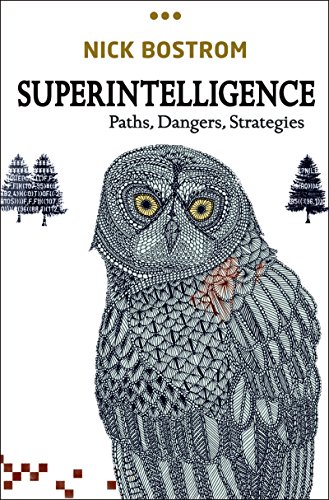8 Best-Selling Superintelligence Books Millions Trust
Insights from Bill Gates, Elon Musk, and Nils Nilsson on must-read Superintelligence books shaping today’s AI discourse




When millions of readers and top experts agree on a set of books, you know you’re looking at something special. Superintelligence—the idea that machines could surpass human intelligence—has become one of the most urgent topics in technology and philosophy. These best-selling books offer time-tested frameworks and deep insights into the risks, ethics, and future possibilities of AI that have captivated both the public and leading thinkers alike.
Experts like Bill Gates, co-founder of Microsoft, have praised Nick Bostrom’s Superintelligence as a critical guide to understanding AI’s potential and pitfalls. Elon Musk, CEO of SpaceX and Tesla, warns through his endorsement of Our Final Invention about urgent challenges humanity faces with AI. Meanwhile, Stanford AI pioneer Nils Nilsson and Cambridge astrophysicist Martin Rees underscore these books’ importance for anyone seeking a serious grasp of AI’s trajectory.
While these popular books provide proven frameworks, readers seeking content tailored to their specific Superintelligence needs might consider creating a personalized Superintelligence book that combines these validated approaches. This way, you get expert knowledge molded exactly to your background and goals.
Recommended by Bill Gates
Co-Founder & Former CEO of Microsoft
“I highly recommend this book”
by Nick Bostrom··You?
by Nick Bostrom··You?
Drawing from his extensive expertise in philosophy, computational neuroscience, and artificial intelligence, Nick Bostrom examines the profound implications of machines surpassing human intelligence. You’ll explore scenarios where superintelligent AI could become uncontrollable and consider strategies to shape its development safely, including the concept of an intelligence explosion. Chapters like the AI control problem and the potential paths to superintelligence provide concrete frameworks to understand these complex issues. This book suits anyone curious about the future of intelligent life and the ethical and strategic challenges posed by advanced AI systems.
Recommended by Leilani Münter
Environmentalist and documentary filmmaker
“@opineno @jrbarrat IMHO “Our Final Invention” is one of the best books ever written on the dangers of AI. I had the pleasure of meeting James for the first time back in 2015, just after I read his book. James is also an accomplished documentary filmmaker.” (from X)
James Barrat, a documentary filmmaker known for his work with National Geographic and PBS, wrote this book to shed light on the rapidly advancing field of artificial intelligence and its potential risks. You’ll gain detailed insights into how AI is integrated into daily life—from smartphone functions to critical infrastructure—and why its progression toward human-level intelligence raises profound challenges. The book profiles leading technologists and explores scenarios where AI’s survival instincts might conflict with human interests, prompting you to consider the ethical and existential stakes. If you’re intrigued by technology’s trajectory and its societal impact, this book offers a thoughtful exploration without sensationalism.
by TailoredRead AI·
This personalized book explores the complex landscape of superintelligence, focusing on battle-tested AI risk strategies tailored to your unique challenges and interests. It combines widely validated knowledge with your specific background, allowing you to engage deeply with concepts like AI safety, ethical dilemmas, control mechanisms, and future technological scenarios. By focusing on your goals, it reveals how to navigate the ethical and strategic dimensions of AI development in a way that resonates with your experience and aspirations. The tailored approach ensures you gain a precise understanding of superintelligence risks and their implications, making it easier to grasp how to apply these insights thoughtfully. This book bridges collective human expertise and your personal learning journey, providing a focused and engaging exploration of AI's future.
by Stuart Armstrong··You?
by Stuart Armstrong··You?
Stuart Armstrong’s background as a research fellow at Oxford's Future of Humanity Institute shapes this concise exploration of machine intelligence surpassing human cognition. You’ll gain insight into the challenges of programming AI with human values, grappling with the philosophical difficulty of defining a "good" world for superintelligent machines. The book drills into how small misalignments in AI goals can lead to vastly different outcomes, emphasizing the fragility and complexity of value encoding. If you’re curious about the ethical and technical hurdles in guiding AI development, this compact volume offers thought-provoking perspectives without overcomplicating the topic.
by Murray Shanahan··You?
by Murray Shanahan··You?
Drawing from his expertise as Professor of Cognitive Robotics at Imperial College London, Murray Shanahan explores the concept of the technological singularity, where artificial intelligence might surpass human intelligence. You’ll gain insight into different AI development pathways and the philosophical questions about identity, rights, and responsibility that arise when machines become superintelligent. Shanahan doesn’t speculate wildly; instead, he examines multiple scenarios—ranging from AI as a beneficial partner to a potential existential threat—encouraging you to think deeply about humanity’s future. Chapters detail advances in biologically inspired AI and engineered intelligence, offering a grounded understanding for anyone curious about AI’s profound societal impact.
by Peter J. Scott··You?
Peter J. Scott, with over three decades of experience at NASA's Jet Propulsion Laboratory and a master's in Computer Science from Cambridge, presents a candid examination of the dual-edge risks posed by rapid technological advancements. In Crisis of Control, you confront the unsettling realities of artificial superintelligences potentially commandeering critical infrastructure and the ease with which weapons of mass destruction could fall into dangerous hands. Scott doesn't shy from difficult truths, blending clear analysis with occasional wit to explore how humanity might navigate these existential threats. This book suits those ready to grapple seriously with the future of AI governance and its profound implications for survival and progress.
by TailoredRead AI·
This tailored book explores the dynamic field of superintelligence through a personalized lens that matches your background and goals. It examines key concepts such as AI development, ethical considerations, and strategic foresight, all focused on delivering rapid, actionable knowledge. By combining widely validated ideas with insights that resonate with your specific interests, this book reveals how to navigate the complexities of superintelligence and its implications effectively. Through a step-by-step, 30-day approach, this tailored guide focuses on helping you achieve fast progress by concentrating on your priorities and skill level, making advanced topics accessible and relevant to your unique learning journey.
by Vincent C. Müller··You?
by Vincent C. Müller··You?
Vincent C. Müller's decades of research into computational systems and AI risks led him to compile a volume that rigorously examines the potential dangers of artificial intelligence surpassing human intelligence. You’ll find discussions from leading thinkers on predictions of AI’s future, the ethical design of AI agents, and various strategies to ensure AI remains beneficial, including machine ethics and utility functions. The book explores contentious debates, such as whether AI will pose a threat or become a useful tool, and delves into concepts like brain emulation and the possibility of a rapid AI takeoff. This book suits those deeply interested in the philosophical and practical challenges surrounding superintelligence and AI safety.
by Uziel Awret, Bryan Appleyard, David Chalmers··You?
by Uziel Awret, Bryan Appleyard, David Chalmers··You?
Uziel Awret's experience as an editor and contributor to the Journal of Consciousness Studies led to this deep exploration of the technological singularity, gathering voices from top thinkers like David Chalmers and Nick Bostrom. You gain a nuanced understanding of whether artificial intelligence could surpass human thought and the ethical and philosophical implications involved. The book's structure, featuring a central chapter by Chalmers followed by commentaries and a concluding response, lets you weigh diverse perspectives on AI's future impact. It’s ideal if you want to grapple with the intellectual debates shaping AI and consciousness rather than quick technological forecasts.
by Mark Gates·You?
Mark Gates approaches artificial intelligence not just as a technology enthusiast but as a guide helping you navigate its unfolding impact on daily life and work. His book delves into how machine learning, deep learning, and neural networks operate, offering clear explanations of complex concepts like natural language programming and AI medicine. You’ll gain insight into both the opportunities AI presents and the ethical dilemmas it raises, including automation’s effects on jobs and society. This book fits anyone curious about AI's near future and practical implications, especially those wanting a grounded overview without excessive jargon or hype.
Proven Superintelligence Methods, Personalized ✨
Get tailored strategies without generic advice—fit for your unique goals.
Trusted by experts and thousands of Superintelligence enthusiasts worldwide
Conclusion
This collection highlights clear themes: the importance of rigorous risk analysis, the ethical challenges of aligning AI goals with human values, and the profound societal shifts that superintelligence could trigger. If you prefer proven methods, start with Nick Bostrom’s Superintelligence for foundational understanding. For validated approaches on existential risks, Our Final Invention and Crisis of Control offer sobering perspectives.
For philosophical depth, Risks of Artificial Intelligence and The Singularity engage with nuanced debates that enrich your grasp of AI’s implications. Alternatively, you can create a personalized Superintelligence book to combine proven methods with your unique needs.
These widely-adopted approaches have helped many readers succeed in navigating the complex landscape of superintelligence. They provide a solid foundation to understand, anticipate, and engage with one of the defining technological challenges of our era.
Frequently Asked Questions
I'm overwhelmed by choice – which book should I start with?
Start with Nick Bostrom’s Superintelligence. It offers a strategic overview of AI risks and development paths, praised by Bill Gates for its clarity and depth. This foundation prepares you to explore more specialized topics in other books.
Are these books too advanced for someone new to Superintelligence?
Not at all. While some dive deep into philosophy and technology, books like Artificial Intelligence by Mark Gates provide accessible explanations, making complex ideas understandable for newcomers.
What's the best order to read these books?
Begin with Superintelligence for broad context, then read Our Final Invention and Crisis of Control to understand risks and governance. Follow with Smarter Than Us and Risks of Artificial Intelligence for ethical and philosophical insights.
Do I really need to read all of these, or can I just pick one?
You can pick based on your interests. For practical AI impact, try Artificial Intelligence. For ethical questions, Smarter Than Us fits. Each book offers distinct perspectives worth exploring over time.
Are any of these books outdated given how fast Superintelligence changes?
These books focus on fundamental challenges and philosophical questions that remain relevant despite rapid AI advances. Their frameworks help you understand ongoing developments in context.
How can I get insights tailored to my specific goals in Superintelligence?
Great question! While these expert books provide solid foundations, personalized books can tailor proven strategies to your background and objectives. Consider creating a personalized Superintelligence book to get focused, relevant insights efficiently.
📚 Love this book list?
Help fellow book lovers discover great books, share this curated list with others!
Related Articles You May Like
Explore more curated book recommendations







